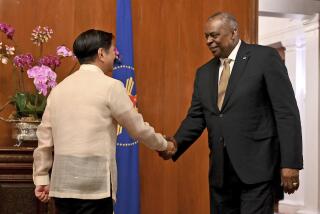Aquino Keeps Bases Options Open : Agreement on 2 Strategic U.S. Facilities to Be Signed Today
- Share via
MANILA — President Corazon Aquino said Sunday that she is keeping her options open on whether two strategic U.S. military bases will be allowed to remain past the 1991 expiration of the current pact.
Aquino told reporters that, after months of sometimes-bitter negotiations on the politically sensitive issue, an agreement providing $481 million annually for the next two years for the bases’ operation will be signed in Washington this afternoon by U.S. Secretary of State George P. Shultz and Philippines Foreign Secretary Raul Manglapus.
Manglapus reportedly canceled plans to return home Saturday when the talks on terms for continued operation of the bases reached a critical stage.
Confers With Aquino
“He (Manglapus) called me up this morning, and they will sign it Monday at 3 p.m., Washington time,” Aquino said of the agreement covering Clark Air Base and Subic Bay Naval Base, America’s largest overseas facilities with 17,000 servicemen plus dependents. The two bases also employ 68,000 Filipinos.
In Washington, Manglapus said that Aquino had given the “go signal” for the pact, but he said some issues are still being discussed. “There is still time to move things around,” he said.
Manglapus did, however, provide some specific details of the agreement for continued operation of the key American bases used to support operations in the Western Pacific and Indian Ocean.
The cash payments would be a big increase over the current $180 million in U.S. military and economic aid attached to the bases, he said, but only a slight boost over the amount of U.S. aid channeled to Manila since Aquino came to power in 1986.
The agreed-upon amount is less than half the $1.2 billion annually sought by the Philippines when talks began in April.
Other Benefits
But Manglapus said there are other benefits that enhance the worth of the package.
He added that the two sides have reached agreement on whether nuclear weapons will be allowed on the bases, but he declined to elaborate.
U.S. officials said the agreement provides for some limitations on storage of nuclear weapons and possibly on airborne activity. They said, however, that the U.S. policy of neither confirming nor denying the presence of nuclear weapons remains unchanged.
The overall agreement is expected to lead to talks on the long-term future of the bases, which many Filipinos want removed after the 41-year-old lease lapses in 1991. Aquino has not yet said whether she favors American use of the bases after 1991.
Hard, Soft Components
Philippine sources said last week that Manglapus had backed down on his compensation demands, deciding to accept a U.S. package consisting of a “hard component” of more than $500 million that will include military and economic aid and assistance in the form of commodities such as wheat as well as a “soft component.”
The sources said the soft component includes the Philippines’ participation in U.S. construction projects overseas, relaxed textile quotas and a share of supply purchases by American bases overseas.
The soft portion of the compensation package obviously provides a face-saving device for negotiators who had raised hopes in the Philippines by seeking a huge payment increase. The sources said a realization that there was bipartisan opposition to the Philippine demand in Congress during an era of budget cuts prompted Manglapus to agree to the U.S. offer.
Loosening of Restraints
The agreement also includes a loosening of U.S. requirements on how some money must be spent, Manglapus said. As a result, more U.S. aid could be used for domestic programs rather than to pay off foreign loans, he said.
The agreement also clears the way for U.S. participation in a multi-nation effort to raise up to $5 billion for the Philippines over five years, should the Administration approve such a plan. Four members of Congress proposed the aid effort, dubbed the “mini-Marshall Plan.”
The United States considers the bases vital to its defense interests in Asia, and some Washington officials had said they were looking for alternative sites if Manila no longer wanted them or asked for too much compensation.
ASEAN Wants Bases to Stay
Neighboring countries, especially some of the Philippines’ partners in the Assn. of South East Asian Nations (ASEAN), privately support retention of the bases as a balance to the Soviet military presence in the area.
Presidential spokesman Teodoro Benigno said any new agreement increasing U.S. aid to the Philippines for the next two years “will certainly create an atmosphere of stability in the Philippines.”
“It will help the Philippines cope with problems of economic recovery and . . . help businessmen plan for the future,” Benigno said.
“A new agreement will also improve the climate of U.S. optimism for the further extension of their lease on the bases after 1991,” he said.
More to Read
Sign up for Essential California
The most important California stories and recommendations in your inbox every morning.
You may occasionally receive promotional content from the Los Angeles Times.













